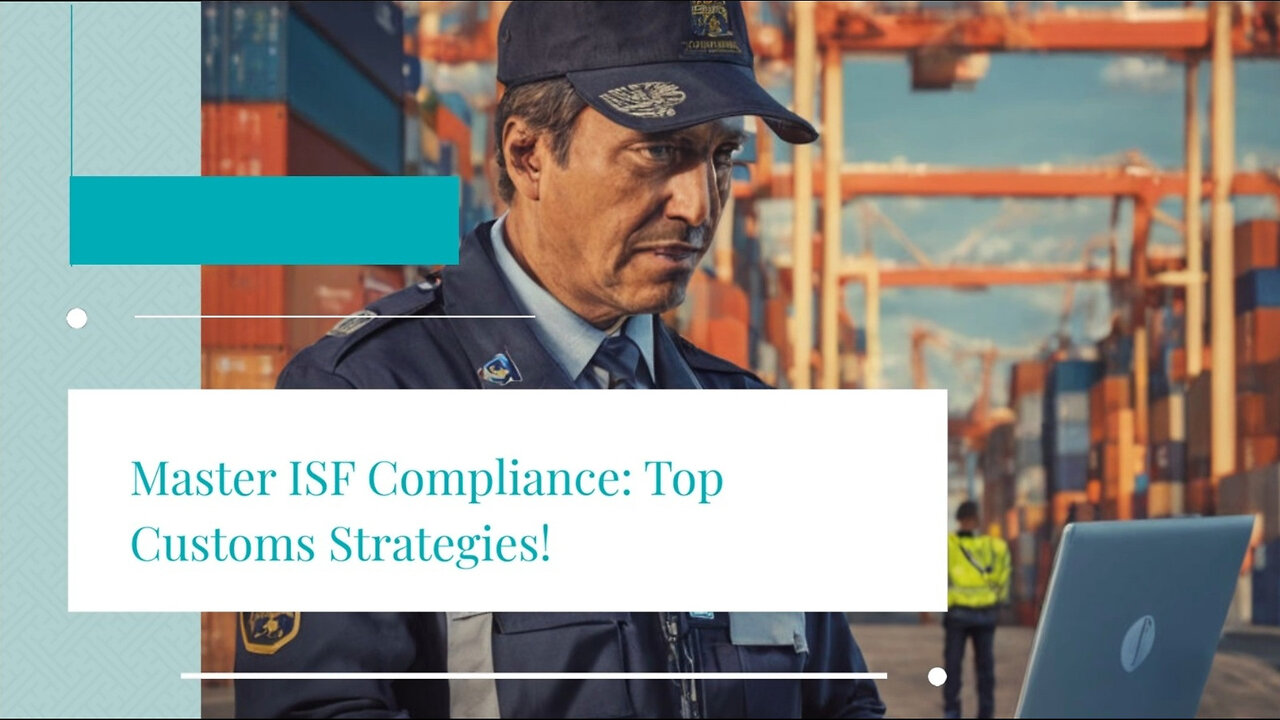Premium Only Content

Mastering ISF Compliance: Best Practices for Smooth and Timely Customs Entry
ISF Checklist || 805-970-7918 || [email protected] || www.isfchecklist.com
In this response, we discuss best practices for Importer Security Filing (ISF) compliance strategies. We first provide a brief overview of ISF, highlighting its purpose and significance in enhancing supply chain security. Then, we delve into the best practices for ISF compliance, including early filing, accurate and complete information, timely updates, partnering with expert customs brokers, and utilizing automated solutions. We emphasize the importance of submitting ISF information well in advance to avoid delays and allow for corrections. Accuracy and completeness of filed information are crucial to prevent penalties or shipment holds. Timely updates facilitate risk assessment and compliance. Partnering with experienced customs brokers and utilizing automated solutions like customs brokerage software can enhance efficiency and accuracy. Overall, implementing these best practices helps importers navigate customs regulations and ensures a smooth customs entry process.
#usimportbond
#isfcustomsbroker
#uscustomsclearing
#isfentry
Video Disclaimer Here: This video is purely educational and has no ties with the US government.
00:25 - Importer Security Filing (ISF) is a requirement by U.S. Customs and Border Protection for importers to electronically submit information about their cargo before it arrives in the United States to enhance security and facilitate risk assessment.
00:54 - Best practices for ISF compliance include early filing, ensuring accurate and complete information, timely updates during transit, partnering with expert customs brokers, and utilizing automated solutions to streamline the process.
01:02 - Early filing of ISF information at least 24 hours before cargo departure helps avoid delays and allows for corrections or amendments if needed.
02:17 Partnering with experienced customs brokers who are knowledgeable about customs regulations and utilizing automated solutions can significantly reduce the risk of compliance issues and enhance efficiency in the customs entry process.
-
 DVR
DVR
vivafrei
7 hours agoLive w/ Stanislav Krapivnik - Military and Political Analyst on Russia, Europe & Beyond!
24.8K15 -
 LIVE
LIVE
Dr Disrespect
7 hours ago🔴LIVE - DR DISRESPECT - ARC RAIDERS - AGAINST ALL DANGER
1,705 watching -
 LIVE
LIVE
LadyDesireeMusic
36 minutes agoYour Daily White Pill- Music & Convo
83 watching -
 LIVE
LIVE
StoneMountain64
4 hours agoBattlefield REDSEC UNSTOPPABLE WIN Squad
36 watching -
 1:40:36
1:40:36
The Quartering
4 hours agoKimmel Pulls Show Mysteriously, Youtube Collapse? & Much MOre
85.3K54 -
 LIVE
LIVE
cosmicvandenim
4 hours agoCOSMIC VAN DENIM | OFF CHARACTER | WARZONE PRACTICE
47 watching -
 DVR
DVR
The Robert Scott Bell Show
4 hours agoMike Adams, Brian Hooker, Live From Brighteon Studios in Austin Texas, Kids Triple Vaccinated, Blood Sugar and Autism, Candy Fed to Cows, Nutrition Reform - The RSB Show 11-7-25
20.4K -
 LIVE
LIVE
GritsGG
3 hours ago#1 Most Warzone Wins 3943+!
24 watching -
 1:15:58
1:15:58
DeVory Darkins
4 hours agoLIVE NOW: Democrats SABOTAGE GOP effort to reopen Government
99.9K52 -
 1:21:21
1:21:21
Tucker Carlson
4 hours agoThe Global War on Christianity Just Got a Whole Lot Worse, and Ted Cruz Doesn’t Care
52.9K241